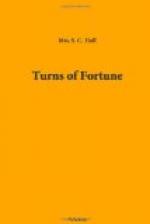“It all depends, Mary, upon the person you meet,” said Mr. Adams, “as upon the book you read; if you choose a foolish book or a bad book, you can expect nothing but vice or foolishness; if you choose a foolish companion, surely you cannot expect kindness or strength.” The kind-hearted man repeated to her all he had before said. “I cannot,” he added, “be guilty of injustice to my children; but I can merge all my own luxuries into the one of being a father to the fatherless.”
But to all the plans of Charles Adams, objections were raised by his eldest nephew and his mother; the youth could not brook the control of a simple straight-minded country man, whose only claim to be considered a gentleman, in his opinion, arose from his connexion with “his family.” He was also indignant with his maternal uncle for his broken promise, and these feelings were strengthened by his mother’s folly. Two opportunities for disposing of the house and its magnificent furniture were missed; and when Mrs. Adams complained to her nearest and most influential connexions that her brother-in-law refused to make her any allowance unless she consented to live at Repton—expecting that they would be loud in their indignation at his hardness—they advised her by all means to do what he wished, as he was really the only person she had to depend upon. Others were lavish of their sympathy, but sympathy wears out quickly; others invited her to spend a month with them at their country-seat, for change of air; one hinted how valuable Miss Adams’ exquisite musical talent would be now. Mary coloured, and said, “Yes,” with the dignity of proper feeling; but her mother asked the lady what she meant, and a little scene followed, which caused the lady to visit all the families in town of her acquaintance, for the purpose of expressing her sympathy with “those poor dear Adamses, who were so proud, poor things, that really there was nothing hut starvation and the workhouse before them!” Another of those well-meaning persons—strong-minded and kind-hearted, but without a particle of delicacy—came to poor Mary, with all prestige of conferring a favour.
“My dear young lady, it is the commonest thing in the world—very painful but very common; the families of professional men are frequently left without provision. Such a pity!—because, if they cannot save, they can insure. We all can do that, but they do not do it, and consequently everywhere the families of professional men are found in distress; so, as I said, it is common; and I wanted you to suggest to your mother, that, if she would not feel hurt at it, the thing being so common—dear Dr. Adams having been so popular, so very popular—that while every one is talking about him and you all, a very handsome subscription could be got up. I would begin it with a sum large enough to invite still larger. I had a great regard for him—I had indeed.”




